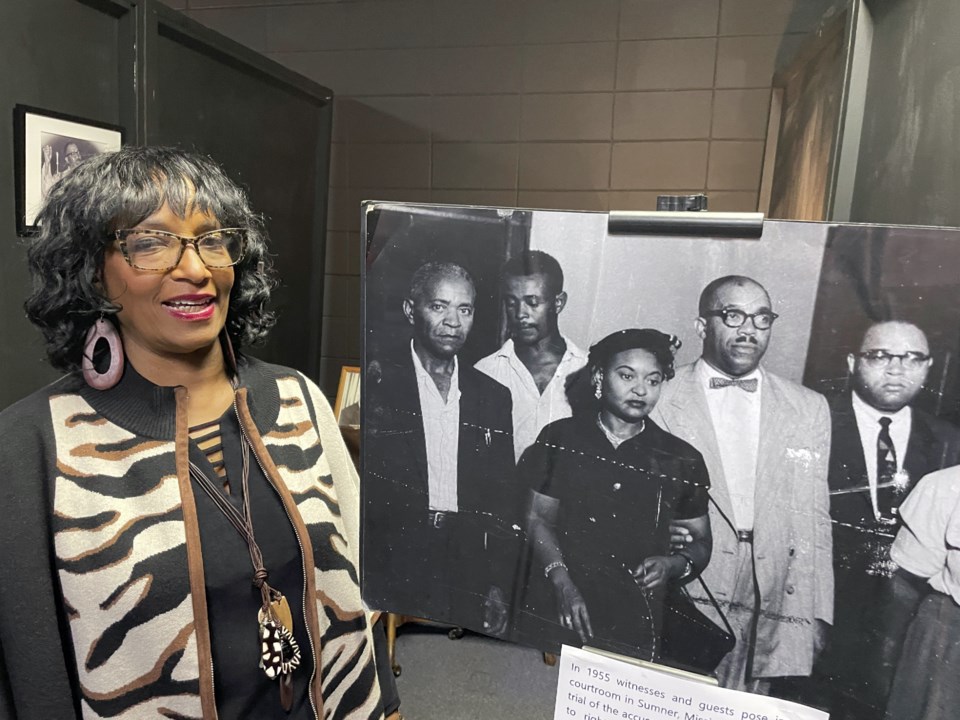MOUND BAYOU, Miss. (AP) — The tiny, all-Black town of Mound Bayou became a safe haven for Emmett Till's mother as she traveled to Mississippi to testify in the murder trial of two white men who lynched her son in 1955.
Hundreds of people — a good portion of Mound Bayou's 1,500 residents — turned out Thursday evening to watch the movie “Till.” The feature film is going into wide release across the U.S. this weekend after being in limited release since Oct. 14.
“This place, this city, is very sacred to the story of Emmett Till,” one of the filmmakers, Keith Beauchamp, told the mostly Black audience in the gymnasium/auditorium of Mound Bayou's John F. Kennedy High School.
The screening happened days after a bronze statue of Till was unveiled about 50 miles (80.5 kilometers) away in Greenwood, Mississippi.
Beauchamp is one of the producers and writers of “Till," which largely focuses on Mamie Till-Mobley's reaction to the loss of her only child and her evolution into a civil rights leader. Her 14-year-old son had traveled from Chicago to Mississippi to visit relatives in August 1955, and white men kidnapped, tortured and killed him after accusations that he flirted with Carolyn Bryant, a white woman working in a country store.
Till-Mobley, who was named Mamie Bradley at the time of her son's death, insisted on an open-casket funeral in Chicago so the world could see her son's brutalized body. Jet magazine published photos.
An all-white, all-male jury in Tallahatchie County acquitted the shopkeeper’s husband, Roy Bryant, and his half brother J.W. Milam just weeks after Till’s body was pulled from a river. The two men later confessed in an interview with “Look” magazine.
Mound Bayou was founded by formerly enslaved people in the cotton-growing Mississippi Delta in 1887 as a freestanding community where Black people could thrive amid the hostility of the Jim Crow era.
NAACP leaders, including Mississippi’s Medgar Evers, coordinated with Dr. T.R.M. Howard, a physician and entrepreneur in Mound Bayou, to provide safety and security for Till’s mother in the town. Mound Bayou also provided shelter for Black journalists who covering the trial 35 miles (56.3 kilometers) away in Sumner.
The lynching of Till galvanized the civil rights movement, and it has reverberated for generations with Black parents who tell their children to be careful in a country that has not shaken racism.
One of the Till relatives who attended the screening Thursday was 65-year-old Joe Stidhum, born two years after Till was killed. He said his grandfather and Till’s mother were brother and sister.
Stidhum said his mother was always strict on him as his 10 siblings as they were growing up in Mound Bayou, but “she didn't tell us her side of it until we got older.” He said he was about 12 or 13 before he learned about Till's violent death.
“Once we got up into teens, that’s when my mom kind of explained to us why she was so protective of us," Stidhum said after the movie.
The closest cinema to Mound Bayou is more than 30 miles (48.3 kilometers) to the south, in Greenville, Mississippi.
Nobody has ever been convicted in Till's lynching. The U.S. Justice Department has opened multiple investigations starting in 2004 after receiving inquiries about whether charges could be brought against anyone still living.
The Justice Department reopened an investigation in 2018 after a 2017 book quoted Carolyn Bryant — now remarried and named Carolyn Bryant Donham — saying she lied when she claimed Till grabbed her, whistled and made sexual advances. Relatives have publicly denied Donham, who is in her 80s, recanted her allegations. The department closed that investigation in late 2021 without bringing charges.
Deborah Watts, another cousin of Till and co-founder of the Emmett Till Legacy Foundation, was among the people who found an unserved 1955 arrest warrant for “Mrs. Roy Bryant" earlier this year in a courthouse basement. In August, a Mississippi grand jury found insufficient evidence to indict Donham. Watts said Thursday that she still wants officials to serve the arrest warrant on Donham.
“Justice delayed since 1955 is justice denied,” Watts told The Associated Press. "Without any hate, malice or violence, we want the same thing any victim's family would want, and that is that those that were responsible be held accountable. No one should be above the law.”
In March, President Joe Biden signed the Emmett Till Anti-Lynching Act. After the movie screening, Beauchamp told the audience that he is all for honoring Till's memory, but he wants more.
“If we're looking for racial reconciliation in this country, it's not going to happen with a statue or a law," Beauchamp said. "We have to have truth and justice.”
Some in the crowd, sitting on blue plastic chairs and bleachers, nodded and said: “Alright. Alright."
____
Follow Emily Wagster Pettus on Twitter at http://twitter.com/EWagsterPettus.
Emily Wagster Pettus, The Associated Press



